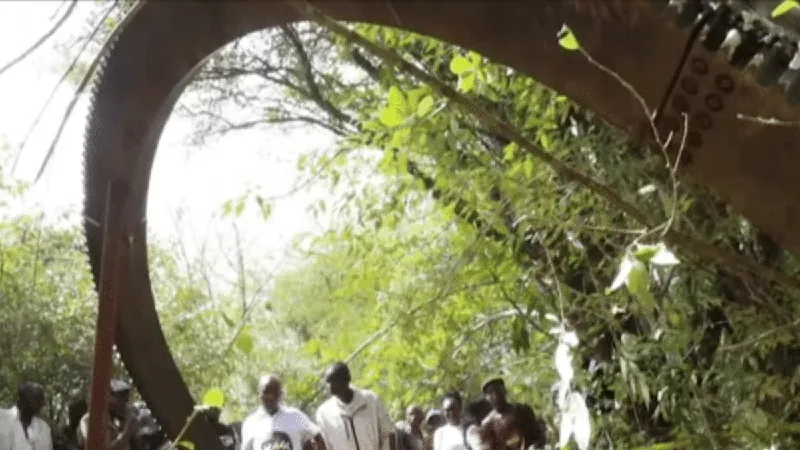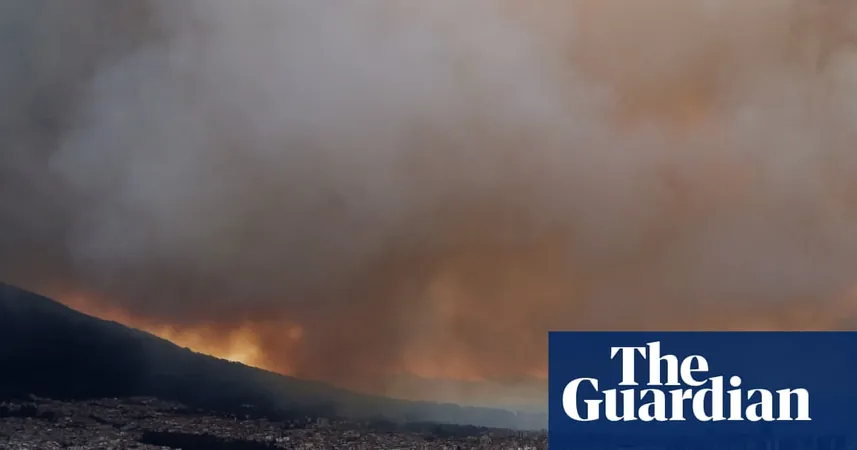
A 1,100-Pound Metal Ring Falls From the Sky in Kenya: What You Need to Know!
2025-01-22
Author: Jessica Wong
A 1,100-Pound Metal Ring Falls From the Sky in Kenya: What You Need to Know!
On December 30, an extraordinary event took place in a small village southeast of Nairobi, Kenya, when a massive metallic ring plummeted to the ground, capturing the attention of the local community and raising significant concerns about space debris.
The colossal object, measuring 8.2 feet in diameter and weighing approximately 1,102 pounds, sparked intense speculation among residents and experts alike. Questions swirled: Was it a fragment from an airplane? A piece of a satellite? Or perhaps remnants from extraterrestrial technology? Miraculously, despite its size and the force of its impact, no injuries were reported.
Swift action was taken by local authorities who cordoned off the area, emphasizing the need for caution regarding the unidentified object's origins. The Kenya Space Agency (KSA) rapidly engaged in the investigation, and their findings revealed that the item was likely a separation ring from a space launch vehicle. KSA described the incident as an “isolated case,” explaining that such components are typically designed to disintegrate upon re-entry or land in uninhabited areas.
However, this situation exposes critical vulnerabilities in current space safety protocols. Kenyan officials are committed to further investigating how this incident occurred and prevent future occurrences. As of now, they have yet to identify which specific launch vehicle was responsible for the debris.
The incident in Kenya brings attention to a pressing global dilemma: the issue of space debris. The increasing number of space missions has resulted in a staggering accumulation of debris in Earth's orbit, ranging from tiny paint flecks to large rocket components. According to NASA, millions of debris pieces are floating in space, with over 27,000 tracked items being significant enough to pose a collision risk. Such debris could remain in orbit for years before eventually descending to Earth, posing potential threats to both operational satellites and people below.
One notable incident occurred in 2024 when a family in Florida took legal action against NASA after lithium battery pallets from the International Space Station crashed onto their property. Cases like these underscore the urgency for international collaboration to address the growing problem of space waste.
Possible solutions being proposed include: - Designing "cleaner" satellites capable of capturing existing debris - Implementing passive systems to safely deorbit outdated satellites - Developing materials that can endure collisions more effectively
Despite these ideas, advancing such solutions globally faces technical challenges and considerable financial commitments. It is crucial that we view outer space not as an infinite dumping ground; the actions taken in space can have direct consequences on life on Earth. Thus, establishing worldwide regulations is essential to ensure that space exploration remains safe and sustainable for future generations.
The incident in Kenya serves as a reminder of our collective responsibility to manage technological advancements in a sustainable manner. By fostering international cooperation and investing in innovative solutions, we can protect our planet while continuing to explore the mysteries lying beyond our atmosphere.
What do you think about space debris? Let’s keep the conversation going!


 Brasil (PT)
Brasil (PT)
 Canada (EN)
Canada (EN)
 Chile (ES)
Chile (ES)
 Česko (CS)
Česko (CS)
 대한민국 (KO)
대한민국 (KO)
 España (ES)
España (ES)
 France (FR)
France (FR)
 Hong Kong (EN)
Hong Kong (EN)
 Italia (IT)
Italia (IT)
 日本 (JA)
日本 (JA)
 Magyarország (HU)
Magyarország (HU)
 Norge (NO)
Norge (NO)
 Polska (PL)
Polska (PL)
 Schweiz (DE)
Schweiz (DE)
 Singapore (EN)
Singapore (EN)
 Sverige (SV)
Sverige (SV)
 Suomi (FI)
Suomi (FI)
 Türkiye (TR)
Türkiye (TR)
 الإمارات العربية المتحدة (AR)
الإمارات العربية المتحدة (AR)